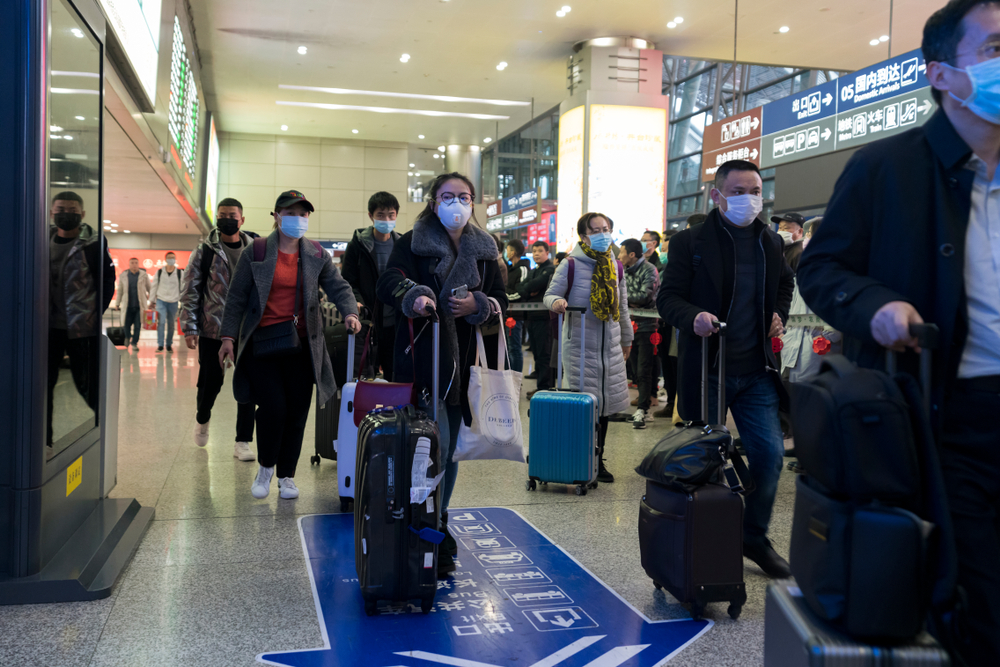
The second wave of Americans arrived in California on Wednesday, traveling from Wuhan, China, the epicenter of the coronavirus (2019-nCoV) epidemic. They will spend days on military bases in quarantine as public health officials determine if there are any cases of the virus and to treat those afflicted. So far there are 12 confirmed cases in the United States. In China, that figure is in the thousands, as 28,018 people have become ill and more than 563 have died as of Feb. 5, according to the National Health Commission of the People’s Republic of China.
Quarantine may seem like the obvious move to quell a virus from moving across borders, but experts testified on Wednesday before the U.S. House of Representatives’ Committee on Foreign Affairs that those measures, along with travel bans, may do little to prevent a virus that could already be circulating within the U.S. population.
“First, we need to seriously reexamine our current policy banning travel from China and quarantining returning travelers,” said Jennifer Nuzzo, associate professor and senior scholar at the Center for Health Security, Johns Hopkins University. “All of the evidence we have indicates that travel restrictions and quarantines directed at individual countries are unlikely to keep the virus out of our borders.”
The United States was a target of travel bans and quarantines in the 2009 flu pandemic. They didn’t work to stop the spread of that virus, Nuzzo added.
Although China is the hotbed of the coronavirus, singling out China for travel bans may penalize it for reporting cases. Other countries could internalize that and be less willing to be transparent about their own outbreaks.
“Travel bans and quarantines will make us less safe if they divert attention and resources from higher priority disease mitigation approaches that we know are needed to respond to cases within the United States,” Nuzzo said, adding that additional emergency funding is necessary, similar to that received in 2009.
Despite the increasing number of coronavirus cases in China, the Chinese government is better prepared to handle this virus than previous virus outbreaks. Jennifer Bouey, senior policy researcher and Tang Chair in China Policy Studies at RAND Corporation, told the committee that China has been able to respond to cases much faster, mainly due to the latest genomic sequencing technologies and global data networks.
“Because of the rapid identification of the virus, many countries, including the United States and China, can now quickly develop a testing kit, monitor the genetic mutations, and have a better understanding of transmission,” Bouey said.
Wide use of social media also pushed the Chinese government to be more transparent about transmission. However, reports today suggest there will be a crackdown on the media and internet in order to control the message regarding this virus.
Ron Klain, former White House Ebola Response Coordinator from 2014-2015, told the committee that several comparisons could be made between the coronavirus response and how the United States handled the initial Ebola outbreak in 2014.
“There should be a single high-level official inside the National Security Council overseeing the response,” Klain said, noting that former President Barack Obama appointed an official to the post during that Ebola outbreak.
Although Klain did not say whether the coronavirus warranted a military response, he said that the 2014 Ebola outbreak necessitated the first-ever deployment of U.S. troops to deal with an epidemic.
Klain supported the other panelists’ arguments that suggest an isolationist policy is not the avenue to take when combating the coronavirus. This covers the travel ban, which will affect goods and services that the United States relies on China. Such goods include critical medicines. China manufactures about 80 percent of the active pharmaceutical ingredients the United States imports. Klain rhetorically asked whether the United States would prevent Chinese pilots or shipping captains from transporting those goods because of the possibility they may carry the coronavirus. It is impossible to lock out China, he added. And even within China, attempts at quarantine aren’t completely restricted. For example, in Wuhan, where there is a city-wide quarantine, people still travel in and outside its borders each day transporting supplies.
“We don’t have a travel ban, we have a travel Band-Aid right now,” Klain said, adding that monitoring everyone carefully “is the only practical thing we can do.”
The committee posed several questions to the experts about the necessity of travel bans and quarantines, including U.S. Rep. Chrissy Houlahan (D-PA) who said: “I’m struggling to understand based on my limited understanding of biology—I’m a mere engineer—why quarantining is not appropriate? Why is it something not useful in this case? How do we know what cases it is useful in?”
Nuzzo responded: “The challenge here is that we are talking about a respiratory virus that can potentially spread between people quite quickly. It is very difficult to know where the disease is spreading, because you can’t get ahead of it in terms of your surveillance. Those are the circumstances that make quarantine challenging, because we don’t know who we should be quarantining fully. We may decide based on the number of cases in China that we should quarantine travelers from China, but we don’t know if travelers from other countries have the virus. We also don’t know if it’s already here, because we’re only testing people who have a connection to China. So that makes it challenging.”
Quarantine — restricting the movement of people who are not yet sick — is not routinely used in public health despite public opinion. It’s reserved for a small group of people, such as in a measles outbreak and within a vaccine-hesitant community. The circumstances surrounding the coronavirus do not meet these standards, Nuzzo said.
Using quarantine may slow the virus, but it does not prevent it, Bouey said.
The panelists agreed that Congress should make efforts to establish a public health emergency fund and foster public-private partnerships to help create vaccine candidates, possibly through BARDA, the Biomedical Advanced Research and Development Authority.

